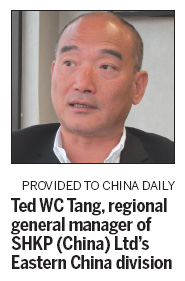SHKP to replicate Hong Kong success story in Shanghai
Updated: 2010-04-30 07:37
By Wang Ying(HK Edition)
|
|||||||||

SHANGHAI - En route to building itself into an international financial and shipping center by 2020, Shanghai will be the epicenter of a huge demand for premium Grade-A office as well as high-end residential space, and Sun Hung Kai Properties Ltd (SHKP) is right there in Shanghai for both, said a senior official with the Hong Kong-based property developer.
In spite of the global financial crisis that forced many clients to cut their budgets, SHKP's Shanghai IFC (International Finance Centre) Tower 1 is almost fully occupied, while the pre-leasing of Tower 2 has been proceeding briskly, in stark contrast with many office buildings located in the Lujiazui Finance and Trade Zone that have been in desperate pursuit of tenants after official launch.
The reason for the difference is in succeeding or failing to understand market needs, said Ted WC Tang, regional general manager of SHKP (China) Ltd's Eastern China division. "The experience of developing office buildings in Hong Kong over the last 20 years tells us that high-end offices are always in short supply in major cities. In order to have your product chosen, you have to understand the exact need of customers," said Tang.
Small details such as the height of the ceiling, the facilities, the location, the texture of the equipment and the design will all be crucial factors, he added.
With Shanghai's star rising, a galaxy of world-known financial institutions, insurance companies and accounting firms, as well as foreign law firms are actively seeking opportunities to expand their businesses in Shanghai, wherein the average rent of premium offices is merely one-fifth to one-quarter that in Hong Kong or New York.
"I am sure every international financial and insurance institution would love to pay the rents if the quality is in line with their demand," said Tang.
Apart from its well-received IFC, SHKP is also actively developing a residential and commercial complex. The International Commerce Centre (ICC), located in Shanghai's high street Huaihai Road is expected to be completed in 2011, and has already attracted many international retailers.
Another residential property situated along the city's iconic Huangpu River, featuring a unique view of both sides of the river, has elicited substantial market interest so far. Although it will not be launched until the second quarter next year, it is expected that the project will be sold at a price higher than the Tomson Riviera price of more than 12,000 yuan per square meter.
"Our final price will be decided by the market, so it is too early to make a prediction," said Tang. But he also noted that he is confident that SHKP's residential projects will be as good as Tomson's, if not better.
Citing Tokyo as a paradigm case, Tang noted that downtown Tokyo residents are vastly outnumbered by those in the suburbs, who have to travel one hour or more by train to get home. "I believe that will soon become true in Shanghai: most people choose to live in nearby cities of Suzhou, Kunshan, or Jiaxing. The city has built more than 4 million kilometers of metro lines across the city; with the addition of the fast developing high-speed trans-city railway network, that situation will arrive naturally and soon," Tang said.
SHKP Group currently has 20 to 30 percent of its total investment on the mainland, and that will be the company's long term strategy in development.
The reason SHKP focuses on high-end property development is that domestic competitors are more familiar with the mainland market. With fewer available land reserves, it is not advisable for SHKP to develop middle- to low- level properties.
"But the middle- to low-end properties are just as important as the high-end ones," Tang said. Over the past 20 years, the nation's GDP growth rate has far outpaced increases in personal and family incomes. Therefore, the supply of middle- to low-end apartments is insufficient. In the past, Hong Kong experienced similar shortfalls, and SHKP developed many government-subsidized houses there in the past.
As a reflection of marketing approaches and strategies that are working for the company, SHKP was able to report a HK$14.34 billion profit during the six months ended December 31, 2009, 19.7 times more than the same period the previous year.
China Daily
(HK Edition 04/30/2010 page2)